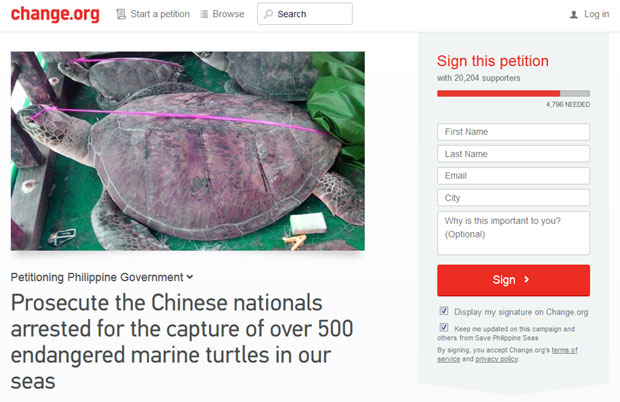Online petition vs Chinese poachers now has over 20,000 signatories
MANILA, Philippines—An online petition supporting the prosecution of the Chinese poachers caught with more than 500 endangered marine turtles in disputed Philippine waters two weeks ago has elicited more than 20,000 signatures.
The appeal was put up on the change.org website by environmental crusader and Ramon Magsaysay Award laureate Antonio Oposa and other environmentalists, including his daughter Anna Oposa.
As of 4:20 p.m. Thursday, the petition had gathered 20,041 signatures.
Some 5,000 more signatures are needed to meet the threshold of 25,000 signatures set by the petitioners to require an official response.
The petitioners expressed their “fullest support for the immediate prosecution of the Chinese nationals with their shameless Filipino collaborators arrested for the capture of over 500 endangered marine turtles in our seas.”
They said the nine Chinese fishermen must be made to account for violating national and international law, including the Wildlife Conservation Act, the Fisheries Code, and the Convention on International Trade of Endangered Species.
“These Chinese nationals pierced the eyes of the marine turtles and tied them through their eye sockets to prevent them from escaping — an act of barbaric cruelty against animals,” the petitioners said.
The group also congratulated and applauded the Philippine National Police Maritime Group Special Boat Unit for seizing the Chinese fishing boat and its crew to enforce maritime and marine conservation laws.
“As the richest marine waters on Earth, we Filipinos must take the lead in marine law enforcement,” they said.
The nine Chinese men were caught on May 6 on a fishing boat that contained 216 live turtles, like Green Sea and Hawks Bill, all critically endangered species, and 381 assorted dead turtles.
They were identified as boat captain Chen Yi Quan, chief engineer Chen Ze Hao and crews Shi Xian Xiong, Shi Liang Duong, He Chuan, Huang Ji Xuan, He Sheng Bao, He Yuan Cheng, and Lu Chuan Fang.
The Chinese nationals initially refused to cooperate upon their arrest, insisting that they were not violating any law because they were purportedly fishing within Chinese waters, a claim disputed by Philippine authorities.
On Wednesday, they pleaded not guilty to violating the Philippine Fisheries Code of 1998 in a Palawan court. The nine accused have yet to post bail. The Department of Justice recommended P30,000 bail each for violation of section 87, and P40,000 each for Section 97, of the code.
The petitioners said the poaching incident was not an isolated one.
“Chinese, Vietnamese, and Taiwanese poachers have been arrested in the past and current administrations. The Chinese poachers have even entered our Tubbataha Reefs,” they said.
“However, as a gesture of friendship and appeasement to China, our Government quickly released the accused. This has been taken as a sign of weakness by the foreign nationals who continue to intrude into our territorial waters and capture endangered species,” they said.
“That time is over,” the petitioners said.
The group challenged the government of China to “face the Philippines” in the International Tribunal of the Law of the Sea “where we shall settle our Differences in a manner appropriate for civilized nations under a regime of the rule of law.”
They said China’s refusal to meet the Philippines in an impartial international forum revealed the lack of legal basis of its “atrocious” claim on the entire South China Sea, including the West Philippine Sea as defined by the UN Convention on the Law of the Sea.
“This refusal to engage the Philippines in an organized and orderly forum also reveals the cowardice and/or sheer arrogance of the Government of China,” they said.
The petitioners further urged government “to be strong in the face of undue pressure.”
“We, the people of the Philippines, stand by our government officials in this battle to uphold the country’s right to protected our Philippine Seas, the richest marine waters on Earth,” they said.
RELATED STORY
